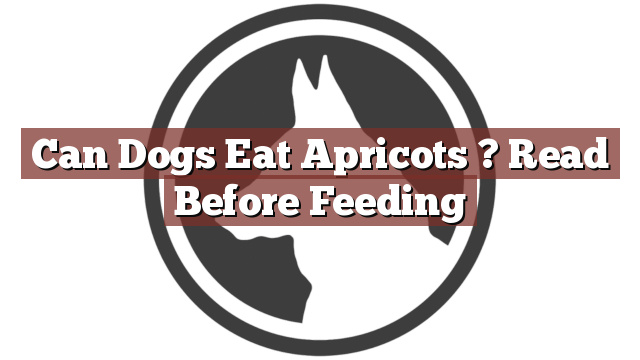Understanding Your Dog’s Dietary Needs
As responsible pet owners, it is essential to understand the dietary needs of our canine companions. Dogs are primarily carnivores, which means their diet should be primarily based on meat. However, they can also benefit from certain fruits and vegetables as a supplement to their main diet. While some fruits are safe for dogs to consume, it is crucial to be aware of which ones can be harmful. One such fruit is the apricot. Before feeding your dog apricots, it is important to consider several factors.
Can Dogs Eat Apricots? Read Before Feeding
Can dogs eat apricots? The answer is both yes and no. While apricots themselves are not poisonous to dogs and can provide some nutritional benefits, there are certain precautions to keep in mind. The fruit contains pits or stones, which can pose a choking hazard and may cause intestinal blockage if ingested. Additionally, apricot pits contain a compound called amygdalin, which can break down into cyanide when chewed or digested. Cyanide is toxic to dogs and can lead to serious health issues.
Pros and Cons of Feeding Apricots to Dogs
There are some potential benefits to feeding apricots to your dog in moderation. Apricots are a good source of vitamins A and C, as well as fiber, which can contribute to your dog’s overall health. These vitamins are essential for a strong immune system and healthy skin. However, it is important to remember that dogs have different nutritional requirements than humans, and their bodies may not process certain substances the same way. Feeding your dog apricots should always be done in moderation and under the guidance of a veterinarian.
On the other hand, there are several risks associated with feeding apricots to dogs. As mentioned earlier, the pits of apricots can pose a choking hazard and potentially lead to intestinal blockage. The cyanide content in apricot pits can also be harmful to dogs. Symptoms of cyanide poisoning include difficulty breathing, dilated pupils, and even seizures. Therefore, it is recommended to remove the pits and stones before giving any apricot to your dog.
Conclusion: Should You Feed Apricots to Your Dog?
In conclusion, while dogs can eat apricots, it is crucial to exercise caution and take necessary precautions. It is always advisable to consult with a veterinarian before introducing any new food into your dog’s diet. If you decide to feed your dog apricots, make sure to remove the pits and stones to eliminate the risk of choking or intestinal blockage. Furthermore, it is essential to limit the amount of apricots your dog consumes and monitor their reaction closely. As with any new food, it is important to observe how your dog reacts and if any negative symptoms occur, discontinue feeding them apricots immediately.
Thank you for taking the time to read through our exploration of [page_title]. As every dog lover knows, our furry friends have unique dietary needs and responses, often varying from one canine to another. This is why it's paramount to approach any changes in their diet with caution and knowledge.
Before introducing any new treats or making alterations to your dog's diet based on our insights, it's crucial to consult with a veterinarian about [page_title]. Their expertise ensures that the choices you make are well-suited to your particular pet's health and well-being.
Even seemingly harmless foods can sometimes lead to allergic reactions or digestive issues, which is why monitoring your dog after introducing any new food item is essential.
The content provided here on [page_title] is crafted with care, thorough research, and a genuine love for dogs. Nevertheless, it serves as a general guideline and should not be considered a substitute for professional veterinary advice.
Always prioritize the expert insights of your veterinarian, and remember that the health and happiness of your furry companion come first.
May your journey with your pet continue to be filled with joy, love, and safe culinary adventures. Happy reading, and even happier snacking for your canine friend!

